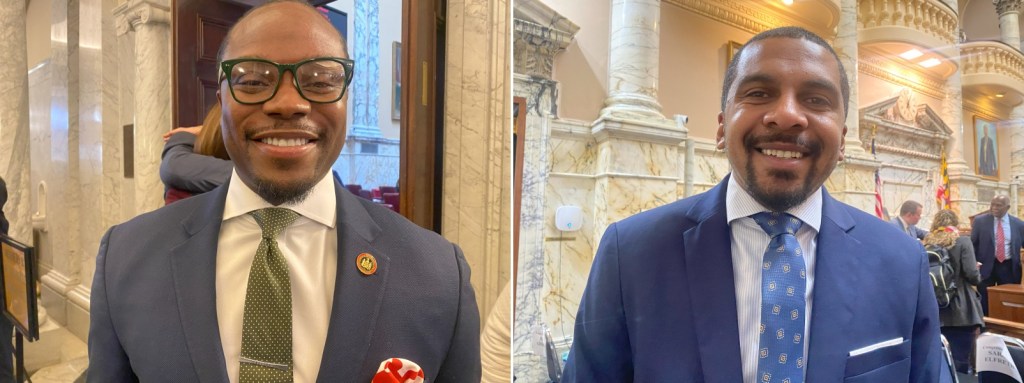By Catherine Pugh
Special to the AFRO
And
By Tashi McQueen
AFRO Staff Writer
tmcqueen@afro.com
As the 447th session of the Maryland General Assembly convened at noon on Jan. 8, there were already more than 245 bills pre-filed.
The AFRO spoke with state lawmakers about their legislative priorities this session.
“Number one is to protect the Blueprint for Maryland’s Future,” State Sen. Alonzo T. Washington (D-Md.-22) told the AFRO on Jan. 8. “I was one of the members of the Kirwan Commission for four years and was also a lead legislator in making the bill pass in the House and getting it over to the Senate. Having those protections for making sure we have more community schools, ensuring that our teachers get the raises they deserve, ensuring there are protections in there for special education students are top priorities for me.”


Del. Caylin Young (D-Md.-45) said he will be working on several pieces of legislation this year that aim to tighten police accountability laws.
One bill he filed would require the investigating unit of a police department to finish its review of officer complaints and forward it to the appropriate party “as soon as possible, but not later than nine months.”
“When you do new legislation and you reform things like police accountability, like the general assembly did in 2021, you get to a point of implementation and you start to understand where we could sharpen up those edges,” said Young.
Maryland State Secretary Susan Lee, a former senator and delegate, shared a few words of wisdom with the AFRO for legislators as the session kicked off.
“Always be positive, listen to your constituents and do whatever you can do to work together in a bipartisan way,” said Lee. “We’re all working for one thing, which is the people of Maryland.”
Among the challenges the legislators must tackle is a $2.9 million budget deficit.
The budget bills have to be balanced before the end of the 2025 legislative session, April 7. Otherwise, the session will be extended to ensure the budget passes.
The legislative session is a 90-day period, which ends at midnight each year. Bills that have not passed by that time die.

According to available data, roughly 2,800 bills are introduced across both chambers each session.
The Maryland General Assembly consists of 188 lawmakers, 47 being state senators and 141 serving as delegates. Each of the 47 districts in Maryland elects one state senator and three delegates.
While all legislators are considered part-time, many are engaged year-round because of community activities and the committees they serve on, which may require meetings after the general assembly closes.
For example, one week after the general assembly convenes, on Jan. 15, Gov. Wes Moore (D), will submit the state budget bill and it is also the final day for the governor to introduce the Capital budget bill.
Legislation can only be introduced by Maryland state senators or delegates, but organizations and other entities often hire lobbyists or lobbying firms to help introduce, support or defeat bills on their behalf.
If legislation is filed on time it has a better chance of getting a hearing. For legislation to become law in the state of Maryland, it has to pass both chambers—the House and the Senate.
For legislators, the 90-day period is very intense because bills have to be written, introduced, given hearings and crossed over to the opposite chamber.
Legislation crossing over means, if it is a Senate bill it has to move to the House chamber and if it is a delegate bill it has to be heard in the Senate. Legislation that passes in one chamber is not guaranteed to pass in the other chamber and can be defeated in either standing committee hearings or may never reach the floor for a vote by the body.


Partnerships across the chambers are important. Senators and delegates will partner to cross-file the same legislation in their respective chambers to expedite its passage.
To testify on legislation those interested must sign up by the day of the hearing, before the hearing begins, otherwise, the chair of the committee is not obligated to hear their testimony.
It is always a good idea for individuals to have their testimony in writing to submit to the committee, even if they plan to testify in person. Written testimony in favor or against the legislation can be sent before the hearing date.
Legislation that is defeated in one chamber can be revived if it passes the other chamber, but it must come back to the initial chamber to receive approval. Bills have to be identical before the final vote on third reader, where no amendments can be added.
Advocacy groups need to be aware of the dates of hearings because if not they miss the opportunity to testify in favor or against the legislation. Those dates are posted on the Maryland General Assembly website and outside each standing committee’s hearing room. Hearings are also livestreamed on the Maryland General Assembly website.
For Maryland community groups, advocacy organizations, institutions or businesses looking to participate in this year’s session, it is important to know the relevant dates for testifying for or against legislation. In this article, the AFRO has provided the following dates so that Marylanders who are interested in taking part in this year’s session can plan ahead and ensure their efforts are effective.
Senate bills introduced after Feb. 3, are referred to the Rules Committee, and the senator has to attend a hearing to explain why the bill should be let out of that committee and assigned to a standing committee.
House bills introduced after Feb. 7 follow a similar procedure but must be heard by two committees: the Executive Nominations Committee and Rules Committee. The bill, like all legislation, must get the votes to get out of those committees before being assigned to a standing committee for a hearing.
March 3 is the last day a bill can be introduced without suspension of the rules in both chambers. If they are accepted they go immediately to the committees above to be voted out before being assigned to a standing committee for a hearing. A bill can be considered emergency legislation and can be voted from the floor to be assigned to a standing committee for a hearing.
On the 69th day of the session, March 17, both chambers will send the bills they intend to pass to the other chamber. Each chamber can vote to approve or disapprove the legislation. Also, any bills received after this date are sent to the Rules Committee and are not guaranteed to leave those committees or receive a standing committee hearing or vote.
On March 31, the 83rd day of the session, both chambers have to pass the budget bill.
On the final day of the session, both chambers are on the floor voting legislation up or down. By midnight, all bills that have not received approval by both chambers are considered dead. Those bills that fail can be brought back in an emergency session or introduced again the following year.
If the governor or general assembly is not satisfied with the outcome of the 90-day session for one reason or another they can extend the session for 30 days. The final date to propose an extended session is May 7.
April 27 is the final day for the presentation of all passed legislation to the governor.
Moore has until May 27, to sign, veto or allow legislation to become law without his signature.
Other than emergency legislation, the earliest date for legislation to take effect is June 1.
Budget, tax and revenue bills take effect on July 1.
Most legislation that includes policy changes takes effect on Oct. 1.
For additional information on the policies and procedures of the general assembly please contact the Library and Information Services for the Department of Legislative Services at 410-946-5400/5410.
The post 2025 Maryland General Assembly kicks off appeared first on AFRO American Newspapers.










